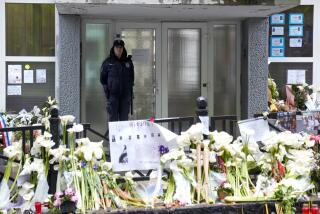NATO Peacekeepers Find Hidden Cache of Weapons in Kosovo Village : Balkans: Discovery comes just two weeks before deadline for separatist Albanian group to disarm. It was unclear if the stash belonged to the KLA.
PRISTINA, Yugoslavia — The North Atlantic Treaty Organization announced Friday that peacekeepers have found hundreds of weapons hidden in a village in Kosovo near the Albanian border. The discovery came just two weeks before the Sept. 19 deadline for the Kosovo Liberation Army to disarm.
Among the weapons that were found Thursday were about 250 Kalashnikov rifles and 50 machine guns, as well as explosives and ammunition. Peacekeepers discovered the cache in the village of Rogovo, about six miles from the Albanian border, said Canadian Maj. Roland Lavoie, a spokesman for peacekeepers.
Lavoie did not say whether the weapons belonged to the KLA, which smuggled arms from Albania into Kosovo--a province of Serbia, the dominant Yugoslav republic--during the Serbian forces’ crackdown against ethnic Albanian separatists.
On Friday, international forensic experts used bulldozers to begin unearthing a field in southwestern Kosovo where the bodies of 50 civilians are believed to be buried. The civilians were believed to be victims of the “ethnic cleansing” campaign by Serbian forces that killed an estimated 10,000 ethnic Albanians in the province and sparked NATO’s air war against Yugoslavia.
The mass grave’s existence was first revealed Thursday in London by British Foreign Secretary Robin Cook. He offered no details beyond saying that 50 bodies were found buried in a garbage dump in Ljubizda, southwest of Pristina, the provincial capital.
The discovery of yet another mass grave believed to contain ethnic Albanians is bound to fuel the already strong anti-Serbian feeling among Kosovo Albanians.
Hashim Thaci, the political leader of the KLA, has urged an end to revenge attacks against Serbs. He has also urged Serbs to return to Kosovo.
But his comments were sure to be ignored by Serbs in Kosovo and elsewhere, who blame the KLA for the wave of anti-Serbian violence that began after NATO’s 11-week air campaign ended with the withdrawal of Serbian forces from the province.
Most of the prewar population of 200,000 Serbs have fled Kosovo since NATO-led peacekeepers rolled into the province in June. Serbs have been the target of killings, abductions and other reprisal attacks by ethnic Albanians.
In other developments Friday, the United Nations said it was replacing the Yugoslav dinar with the German mark and other Western currencies in the province, although Kosovo remains officially part of Yugoslavia. U.N. officials said authorities in Belgrade, the Yugoslav and Serbian capital, were not consulted before the decision was made.
And in Pristina, a British soldier removed a hand grenade from a truck parked outside the U.N. police building, 200 yards from the office of U.N. mission chief Bernard Kouchner.
More to Read
Sign up for Essential California
The most important California stories and recommendations in your inbox every morning.
You may occasionally receive promotional content from the Los Angeles Times.










